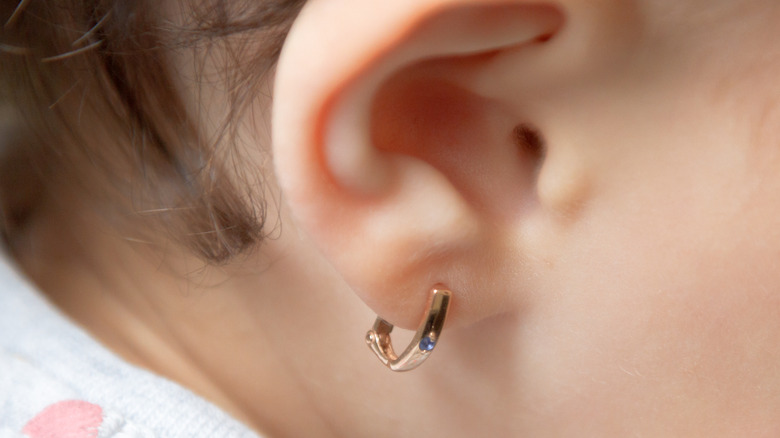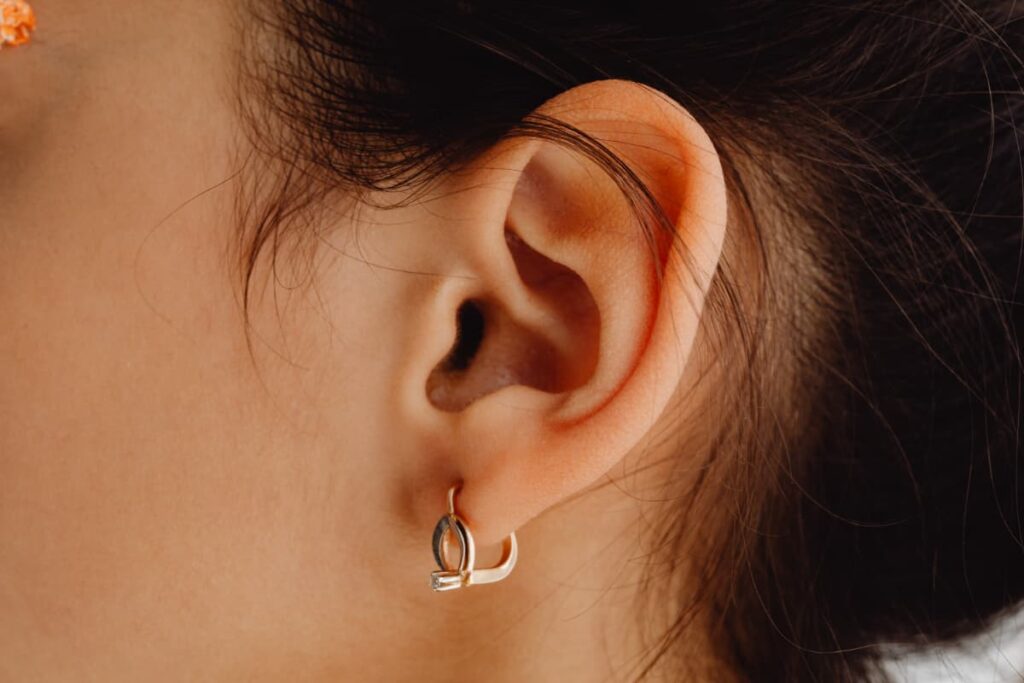Earrings can suddenly cause discomfort due to various reasons. Allergic reactions to metals like nickel in earrings are common, resulting in itching, redness, or swelling. Infections can arise from prolonged wear of non-hypoallergenic earrings, leading to pain and irritation in the earlobe. Skin sensitivity might change over time, causing previously tolerated materials to become bothersome.
Heavier or larger earrings can also exert more pressure on the earlobes, causing discomfort. Continuous wearing of earrings, especially heavy ones, can stretch the piercing and lead to pain. If earrings suddenly cause pain, it’s advisable to remove them and inspect the earlobes.
How does ear anatomy influence earring discomfort?
Ear anatomy plays a significant role in the comfort of wearing earrings. Several aspects of ear anatomy can impact how earrings feel and whether they cause discomfort:
Earlobe Thickness
Thicker or thinner earlobes can affect how earrings fit. Thicker earlobes may require longer posts or hooks to comfortably accommodate the earring without pinching or feeling too tight. Thinner earlobes may not provide as much support for heavier earrings and might experience more strain.
Piercing Placement
The placement of the piercing hole can impact comfort. If the piercing is too high or too low on the earlobe, it can affect how the earring hangs and cause discomfort due to pressure or an unbalanced feeling.
Sensitivity

Some individuals have more sensitive skin or allergic reactions to certain metals used in earrings. For instance, nickel allergies are quite common, leading to irritation, redness, or itching. Using hypoallergenic materials like surgical stainless steel, titanium, or gold can alleviate these issues.
Earring Weight
Heavier earrings can cause discomfort, especially if the earlobes aren’t used to supporting that weight. Over time, this can lead to stretching of the piercing hole or even tearing in extreme cases.
Earring Design
The shape, style, and design of the earring can impact comfort. For example, earrings with sharp edges or rough surfaces might irritate the skin or cause abrasions. Similarly, certain earring shapes like hoops or dangling earrings might swing or tug, leading to discomfort.
Allergic Reactions
Apart from metal allergies, some individuals might have reactions to other materials used in earrings, such as certain plastics or coatings.
Piercing Healing
If the piercing is not fully healed, wearing earrings can cause discomfort or even infection. It’s crucial to follow proper aftercare instructions until the piercing fully heals.
What causes sudden ear pain from earrings?
If you experience sudden ear pain from earrings, it’s essential to remove the earrings immediately and inspect the affected area.
Allergic Reactions
Some people may develop sudden ear pain due to an allergic reaction to the metal or material used in the earrings. Nickel allergies are common and can cause redness, itching, swelling, and pain in the earlobes.
Infection
If the earrings or earlobes are not cleaned properly, or if the earrings themselves are unclean, bacteria can enter the pierced area, leading to an infection. Symptoms may include sudden pain, warmth, redness, swelling, and discharge.
Earring Trauma or Irritation
Wearing heavy or large earrings that pull on the earlobes can cause sudden pain due to irritation or even injury. Continuous pressure or friction from the earrings can lead to soreness or discomfort.
Piercing Issues
If the piercing is relatively new or hasn’t completely healed, changing earrings or wearing certain types of earrings may cause sudden pain. Sometimes, the earring can get caught on clothing or hair, causing trauma to the piercing site.
Earring Tightness or Incorrect Fit
Earrings that are too tight or have a design that doesn’t suit the individual’s ear anatomy can cause sudden pain or discomfort.
Cysts or Keloids
In some cases, cysts or keloids can form around the piercing area, leading to sudden pain, tenderness, or inflammation.
What are the common signs of earring-related ear pain?

Earring-related ear pain can manifest in various ways, with several common signs to watch out for. The earlobe or the area around the piercing may feel sore or tender to the touch, ranging from mild discomfort to severe soreness.
Inflammation is another key indicator, presenting as redness, warmth, and swelling around the piercing site, signaling irritation or potential infection. Irritation from earrings, particularly those made of certain metals or materials, can cause itching or a burning sensation on or around the earlobe.
An infected piercing might produce discharge like pus or blood, necessitating immediate attention. Pain or discomfort when touching or adjusting earrings may suggest improper fit or irritation.
Any visible changes in the piercing hole, such as increased size, abnormal shape, or the presence of bumps, could indicate underlying issues.
Additionally, generalized ear pain or discomfort may occur, especially with heavy earrings or those exerting pressure on certain areas of the ear.
Monitoring these signs is essential, and if observed, removing the earrings, cleaning the area, and seeking medical advice if symptoms persist or worsen is recommended for proper evaluation and treatment.
FAQ’s
Why do my ear piercings hurt after years?
Ear piercings might hurt after years due to various reasons like irritation from certain earrings, infections, changes in jewelry, or developing an allergy to the metal used in the earrings.
What are the best earrings for sensitive ears?
Hypoallergenic earrings made from materials like surgical stainless steel, titanium, or gold are often considered best for sensitive ears as they are less likely to cause allergic reactions.
Can a piercing reject years later?
Yes, a piercing can still reject years later due to various factors like trauma, allergies, improper care, or using jewelry that causes irritation.
Why is my healed piercing suddenly irritated?
A healed piercing can suddenly become irritated due to various reasons like wearing certain types of earrings that cause irritation, an allergic reaction to the jewelry, or accidental trauma to the piercing site.
What do you do if your earring hole hurts?
If your earring hole hurts, it’s advisable to remove the earrings, clean the area with a saline solution, avoid wearing earrings for some time, and consult a healthcare professional if the pain persists or worsens.
How do you treat a sore earring hole?
Treating a sore earring hole involves cleaning the area with saline solution, applying a mild antibiotic ointment, avoiding wearing earrings until the soreness subsides, and seeking medical advice if needed.
Final Words
Ear anatomy can affect how comfortable earrings feel when worn. The thickness of the earlobe, the placement of the piercing, and sensitivity to certain materials can all influence earring discomfort. Factors like earring weight, design, and proper healing of piercings also play a role.
Signs of earring-related ear pain include soreness, redness, swelling, itching, discharge, and discomfort when touching the earrings. It’s important to pay attention to these signs and take necessary steps like removing the earrings, cleaning the area, and seeking help if symptoms persist for proper care and treatment.

